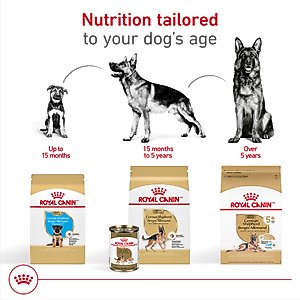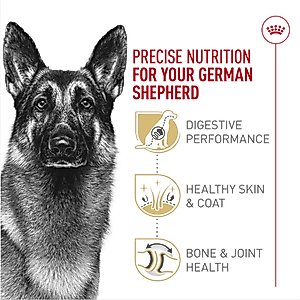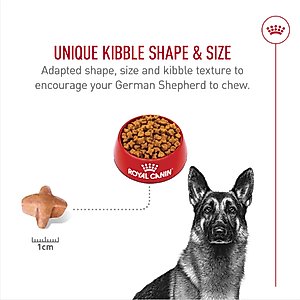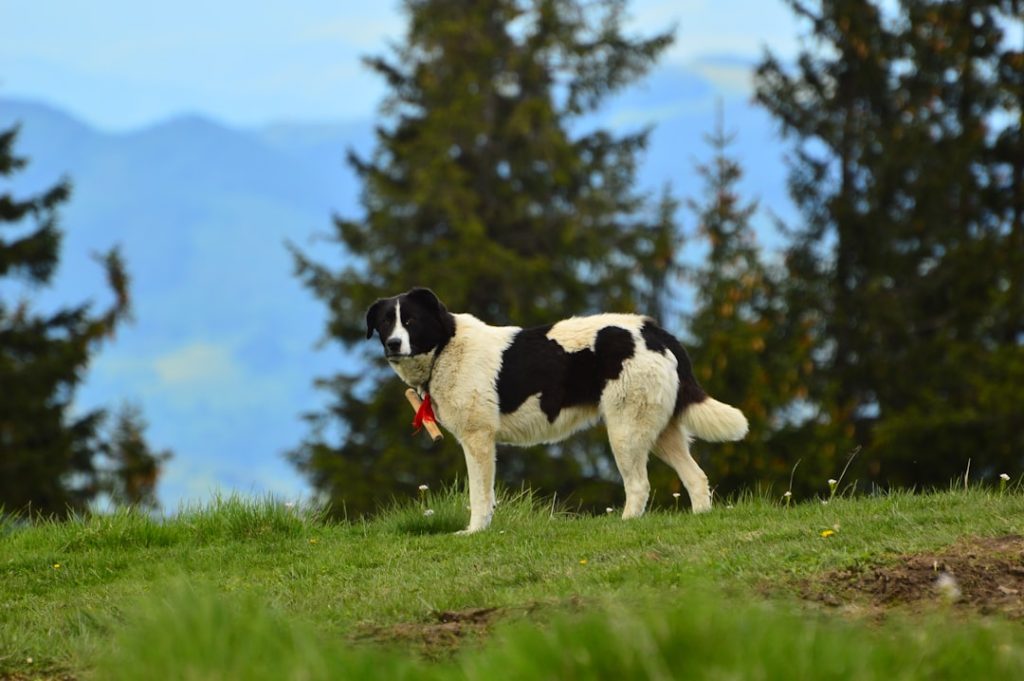Choosing the right dog food for your German Shepherd can feel overwhelming. You want what’s best for your furry friend, ensuring they stay healthy, energetic, and happy.
German Shepherds have unique dietary needs, and selecting the ideal food can make a world of difference in their well-being. Imagine watching your pup thrive, with a shiny coat and boundless energy, simply because you made the right choice. Are you ready to discover the secret to keeping your German Shepherd at their best?
Keep reading, and unlock the key to optimal nutrition for your beloved companion.

Credit: www.chewy.com
Diet Needs Of German Shepherds
Understanding the diet needs of your German Shepherd is crucial for their health and happiness. This breed requires a balanced diet tailored to their unique physiology and activity level. Paying attention to what you feed can help prevent common health issues and keep your dog energetic and strong.
Essential Nutrients For Health
Your German Shepherd needs a diet rich in high-quality proteins to support muscle development and repair. Look for foods with real meat like chicken, beef, or fish as the first ingredient.
Fats are important too—they provide energy and help maintain a shiny coat. Omega-3 and omega-6 fatty acids are especially beneficial for skin and joint health.
Don’t forget about carbohydrates and fiber. They fuel your dog’s activity and aid digestion, but avoid fillers like corn and soy that offer little nutritional value.
Age-based Dietary Requirements
Puppies need more calories and nutrients to fuel their rapid growth. Choose puppy formulas rich in protein and calcium to support developing bones and muscles.
Adult German Shepherds require balanced maintenance diets that keep them lean and active. Overfeeding can quickly lead to weight gain, which strains their joints.
Senior dogs benefit from diets lower in calories but enriched with joint-supporting ingredients like glucosamine and antioxidants to help with aging issues.
Common Allergies And Sensitivities
German Shepherds are prone to food allergies and sensitivities, often showing symptoms like itching, ear infections, or digestive upset.
Common triggers include beef, dairy, wheat, and chicken. If you notice these signs, try switching to limited ingredient diets or novel protein sources like duck or venison.
Consult your vet for allergy testing and consider rotating protein sources to minimize reactions and keep your dog comfortable.
Types Of Dog Food
Choosing the right type of dog food is essential for German Shepherds. Their large size and active nature require balanced nutrition. Different food types offer unique benefits. Understanding these helps in making the best choice for your dog’s health and happiness.
Dry Kibble Benefits
Dry kibble is popular and easy to store. It helps keep teeth clean by reducing plaque build-up. Kibble is cost-effective and convenient for busy owners. Many formulas include essential vitamins and minerals. It also has a long shelf life.
Wet Food Advantages
Wet food has high moisture content. It helps keep dogs hydrated. The soft texture is gentle on older dogs’ teeth. Wet food usually has strong aromas and flavors. This can encourage picky eaters to eat more. It is also rich in protein and nutrients.
Raw And Homemade Diets
Raw and homemade diets offer fresh ingredients. They allow control over what your dog eats. Many owners prefer this for natural nutrition. These diets can improve coat shine and energy. Preparation takes time and careful planning. Consult a vet to ensure balanced meals.
Top Ingredients To Look For
Choosing the right ingredients in your German Shepherd’s food supports their health and energy. Quality ingredients help build strong muscles and keep joints healthy. Nutrients also protect the skin and coat, making your dog look and feel great.
High-quality Proteins
Proteins are the building blocks of muscles and tissues. Look for real meat like chicken, beef, or fish listed first. Avoid foods with unnamed meat by-products or fillers. Protein helps German Shepherds stay active and recover after exercise.
Healthy Fats And Oils
Fats provide energy and keep the coat shiny. Omega-3 and omega-6 fatty acids reduce inflammation and support brain health. Ingredients like fish oil, flaxseed, and chicken fat are excellent sources. Balanced fats improve joint function and overall vitality.
Vitamins And Minerals
Vitamins and minerals support the immune system and bone strength. Look for foods with added vitamins A, C, D, and E. Calcium and phosphorus help maintain strong teeth and bones. These nutrients promote growth and keep your German Shepherd healthy.

Credit: www.chewy.com
Best Dog Food Brands For German Shepherds
Choosing the right dog food brand for your German Shepherd supports their health and energy. These dogs need food that suits their size, activity level, and digestion. Quality ingredients help maintain strong muscles and a healthy coat. Some brands focus on nutrition specific to this breed’s needs.
Below are options that fit different budgets and dietary needs. Each offers balanced nutrition designed for German Shepherds.
Premium Brand Recommendations
- Orijen: High protein with fresh meats and no fillers
- Blue Buffalo Wilderness: Grain-free, rich in antioxidants
- Wellness CORE: Natural ingredients and probiotic support
- Canidae PURE: Limited ingredients, good for sensitive stomachs
Budget-friendly Options
- Purina Pro Plan: Balanced nutrition at a reasonable price
- Diamond Naturals: Contains superfoods and omega fatty acids
- Hill’s Science Diet: Vet-recommended, supports joint health
- Rachael Ray Nutrish: Real meat and simple ingredients
Specialty Formulas
- Royal Canin German Shepherd: Tailored for breed-specific needs
- Nutro Ultra Large Breed: Supports large breed joint health
- Earthborn Holistic Large Breed: Grain-free with added glucosamine
- Natural Balance L.I.D.: Limited ingredient diet for allergies
Feeding Tips For Optimal Health
Feeding your German Shepherd the right way is key to keeping them lively and healthy. It’s not just about what you feed but also how much and how often. Getting these details right supports their energy, weight, and overall well-being.
Portion Control Guidelines
Overfeeding can lead to unwanted weight gain, which stresses your dog’s joints and can cause health issues. Use a measuring cup to give consistent portions tailored to your dog’s age, weight, and activity level. Check the dog food package for recommended serving sizes, but adjust based on your dog’s condition and vet advice.
Here’s a quick guide for adult German Shepherds:
| Weight (lbs) | Daily Portion (cups) |
|---|---|
| 50-70 | 3 to 4 |
| 70-90 | 4 to 5 |
| 90+ | 5 to 6 |
Have you noticed your dog begging more often? It might be a sign to reevaluate portion sizes rather than just giving extra treats.
Feeding Frequency
Most adult German Shepherds do well with two meals a day—morning and evening. This keeps their metabolism steady and prevents overeating. Puppies need more frequent meals, usually three to four times daily, to support their rapid growth.
Try to feed at the same times each day to build a routine. Have you ever had your dog refuse food? Sometimes irregular feeding schedules cause them to lose interest.
Hydration Importance
Water is just as important as the food you provide. Make sure fresh water is always available, especially after exercise or meals. Dehydration can lead to serious health problems, including kidney issues and lethargy.
If your dog isn’t drinking enough, try changing the water frequently or offering water in different bowls. Have you considered adding a splash of low-sodium broth to encourage more drinking?
Signs Of Good And Bad Food Choices
Choosing the right food for your German Shepherd is crucial. The food affects their health, mood, and overall well-being. Knowing how to spot signs of good and bad food helps you make better choices. Watch your dog’s body and behavior for clues about their diet quality.
Healthy Coat And Skin
A shiny, soft coat shows your dog is eating well. Healthy skin is smooth and free from redness or flakes. Dull fur or itchy skin can mean poor food quality or allergies. Proper nutrients like omega fatty acids support a healthy coat.
Energy Levels And Behavior
Good food fuels your German Shepherd’s energy. They stay active, alert, and playful throughout the day. Low energy, sluggishness, or irritability may signal nutrient deficiencies. Balanced meals keep your dog happy and lively.
Digestive Health Indicators
Normal digestion shows your dog’s food suits them. Firm, regular stools mean good digestion. Diarrhea, constipation, or gas can point to bad food choices. Digestive health improves with high-quality ingredients and proper fiber.

Credit: www.chewy.com
Frequently Asked Questions
What Ingredients Are Best For German Shepherd Dog Food?
High-quality protein like chicken or beef is essential. Include healthy fats, whole grains, and vegetables. Avoid fillers, artificial preservatives, and by-products for balanced nutrition and better digestion.
How Often Should I Feed My German Shepherd Daily?
Adult German Shepherds typically need two meals per day. Puppies require three to four smaller meals. Regular feeding times help maintain energy and support healthy digestion.
Can German Shepherds Eat Grain-free Dog Food?
Yes, grain-free food suits some German Shepherds with allergies. However, consult a vet first, as grains can provide essential nutrients and energy for most dogs.
What Are Common Food Allergies In German Shepherds?
Common allergies include beef, dairy, wheat, and chicken. Symptoms are itching, ear infections, and digestive issues. Identifying allergens helps choose the right hypoallergenic dog food.
Conclusion
Choosing the right food helps keep your German Shepherd healthy. High-quality ingredients support strong muscles and shiny fur. Balanced nutrition boosts energy and aids digestion. Avoid fillers and artificial additives for better health. Always check the label for protein and fat content.
Regular meals keep your dog happy and active. Consult your vet to match food with your dog’s age and needs. Good food means a happier, healthier German Shepherd every day. Simple choices make a big difference in your pet’s life.

